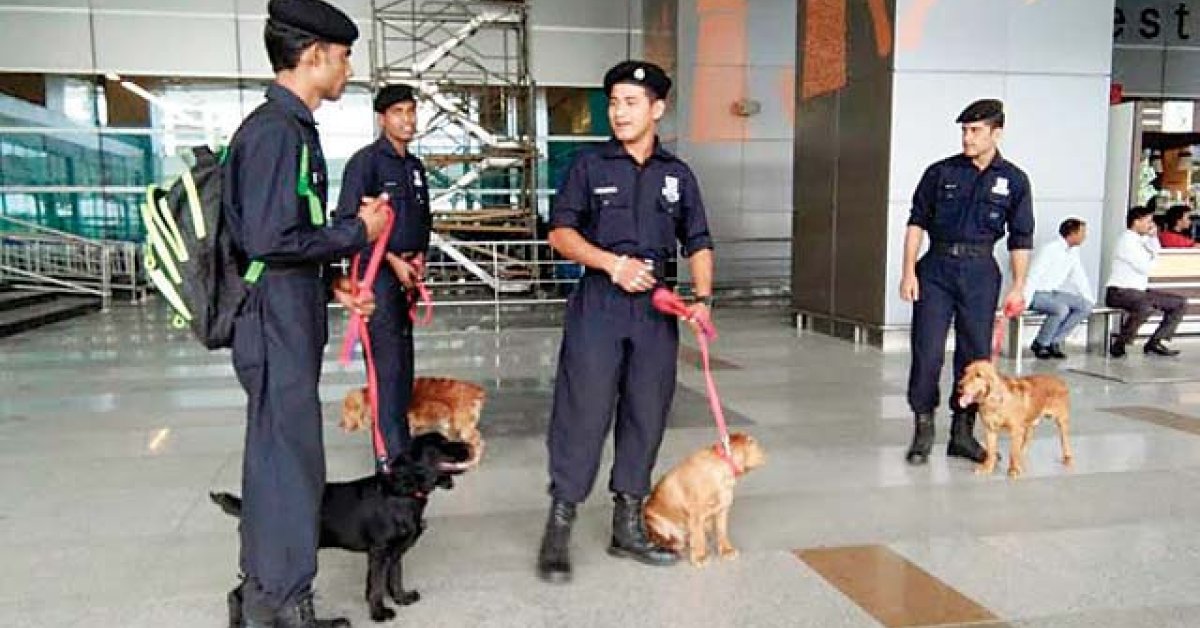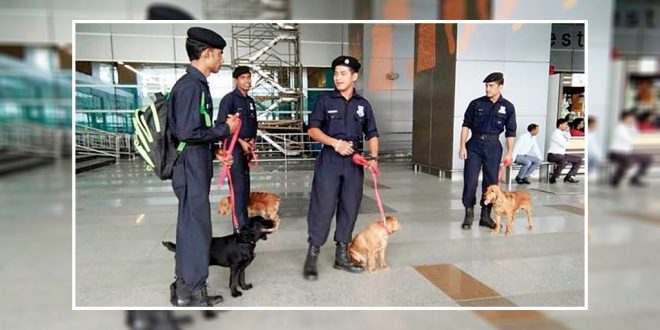CISF Dogs At Airports Will Be Soon Replaced By Robotic Ones
Shakti - Dec 04, 2018

CISF still depends on dogs and human for security ensuring. In this article, their efforts to alter this by using new technologies will be displayed.
- This Is The First Airport For Flying Cars In The World
- North Korea Targets And Hacks Security Researchers' Computers, Google Finds
- Top 15 Scariest Airport Runways That Flirt With Danger
Central Industrial Security Force (CISF) in German, Labrador and Belgian Malinois often uses sniffer dogs to support security activities at airports. However, now they may be replaced by technological canines.
According to CISF officers, these canines are not only able to do an X-ray scan but also useful to sniff explosives by their noses.
CISF dogs at Delhi International Airport, India
The application of industrial dogs was first spotted at the 2018 Global Aviation Security Symposium organized in Montreal, Canada, with attendance of CISF DG Rajesh Ranjan and DG MA Ganapathy, who responsible for India aviation security.
At present, high resourced countries such as the US, the UK, Japan, Canada, Korea have employed robotic devices at airports on several processes, including passenger data and safety checks.
CISF authorities said that they went to the universal aviation conference hold by ICAO (International Civil Aviation Organisation) last week and had a productive ally consultation with EU nations as well as other members of ICAO. “We already have a tie-up with Transport Security Administration (TSA) of the United States but now we have a capacity building pact with the EU as well, which will help us explore a lot about new technologies and methods of securing our airports,” said an authority.
In addition to robotic dogs, other alternative technologies were also put into discussion, including CT scanners for baggage check, artificial intelligence, advanced explosive detectors, and biometric access control systems.
The Indian government has been overinvesting on people to ensure security, especially at airports. That is the reason why they need to have new technologies which are able to reduce the crime rate in aviation sector while encouraging the growth of air transportation.
CISF, owning the largest security system of South Asia, has already set up biometric devices at some airports together with body scanners. Other important locations are also under their protection, such as the Delhi Metro station, space and nuclear systems, government buildings and fuel facilities where security is the first priority.
An authority revealed that unification of ICAO members is a regular topic of the conference. This means the replacement of technological devices has to be expanded to get more protection in the future.
Additionally, solutions for emerging threats was discussed in a two-day conference, which resulted in an agreement among ICAO members on the demand for human resources training and application of an improved security system.
The aviation specialists also expressed a desire to create a risk-based security policy for better aviation safety.
Hemendra Singh, the spokesperson of CISF, indicated in the conference that a new security program, named Global Aviation Security Plan (GASeP), had been introduced and considered.
During discussions among countries, CISF also emphasized their opinion on important infrastructure protection from both hijacking and terrorism, he added.
Featured Stories

Features - Jan 29, 2026
Permanently Deleting Your Instagram Account: A Complete Step-by-Step Tutorial

Features - Jul 01, 2025
What Are The Fastest Passenger Vehicles Ever Created?

Features - Jun 25, 2025
Japan Hydrogen Breakthrough: Scientists Crack the Clean Energy Code with...

ICT News - Jun 25, 2025
AI Intimidation Tactics: CEOs Turn Flawed Technology Into Employee Fear Machine

Review - Jun 25, 2025
Windows 11 Problems: Is Microsoft's "Best" OS Actually Getting Worse?

Features - Jun 22, 2025
Telegram Founder Pavel Durov Plans to Split $14 Billion Fortune Among 106 Children

ICT News - Jun 22, 2025
Neuralink Telepathy Chip Enables Quadriplegic Rob Greiner to Control Games with...

Features - Jun 21, 2025
This Over $100 Bottle Has Nothing But Fresh Air Inside

Features - Jun 18, 2025
Best Mobile VPN Apps for Gaming 2025: Complete Guide

Features - Jun 18, 2025
A Math Formula Tells Us How Long Everything Will Live
Read more

ICT News- Feb 20, 2026
Tech Leaders Question AI Agents' Value: Human Labor Remains More Affordable
In a recent episode of the All-In podcast, prominent tech investors and entrepreneurs expressed skepticism about the immediate practicality of deploying AI agents in business operations.

ICT News- Feb 19, 2026
Escalating Costs for NVIDIA RTX 50 Series GPUs: RTX 5090 Tops $5,000, RTX 5060 Ti Closes in on RTX 5070 Pricing
As the RTX 50 series continues to push boundaries in gaming and AI, these price trends raise questions about accessibility for average gamers.

ICT News- Feb 18, 2026
Google's Project Toscana: Elevating Pixel Face Unlock to Rival Apple's Face ID
As the smartphone landscape evolves, Google's push toward superior face unlock technology underscores its ambition to close the gap with Apple in user security and convenience.

Comments
Sort by Newest | Popular